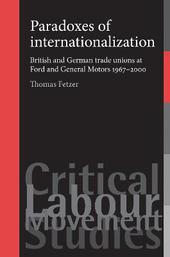
|
Paradoxes of Internationalization: British and German Trade Unions at Ford and General Motors 1967-2000
Hardback
Main Details
| Title |
Paradoxes of Internationalization: British and German Trade Unions at Ford and General Motors 1967-2000
|
| Authors and Contributors |
By (author) Thomas Fetzer
|
| Series | Critical Labour Movement Studies |
|---|
| Physical Properties |
| Format:Hardback | | Pages:240 | | Dimensions(mm): Height 234,Width 156 |
|
| Category/Genre | Political economy |
|---|
| ISBN/Barcode |
9780719080975
|
| Classifications | Dewey:331.88094 |
|---|
| Audience | | Professional & Vocational | |
|---|
|
Publishing Details |
| Publisher |
Manchester University Press
|
| Imprint |
Manchester University Press
|
| Publication Date |
30 September 2012 |
| Publication Country |
United Kingdom
|
Description
Paradoxes of internationalization deals with British and German trade union responses to the internationalization of corporate structures and strategies at Ford and General Motors between the late 1960s and the early twenty-first century. The book is based on research in numerous archives in Britain, Germany and the United States. The book points to the paradoxical effects of internationalization processes. First, it demonstrates how internationalization reinforced trade unions' national identities and allegiances. Second, the book highlights that internationalization made domestic trade union practices more similar in some respects, while it simultaneously contributed to the re-creation of diversity between and within the two countries. Third, the book shows that investment competition was paradoxically the most important precondition for the emergence of cross-border cooperation initiatives. The book will be of interest to academics and students in a range of disciplines from comparative industrial relations, to international political economy, business studies and transnational history. -- .
Author Biography
Thomas Fetzer is Assistant Professor in European Studies at Central European University, Budapest. -- .
Reviews"This is a fascinating study of the transition in Britian and German unions as they responded to the increased competition for investment in the European automobile industry" (Wayne Lewchuk; Labour/Le Travail, Volume 73 Spring 2014) -- .
|